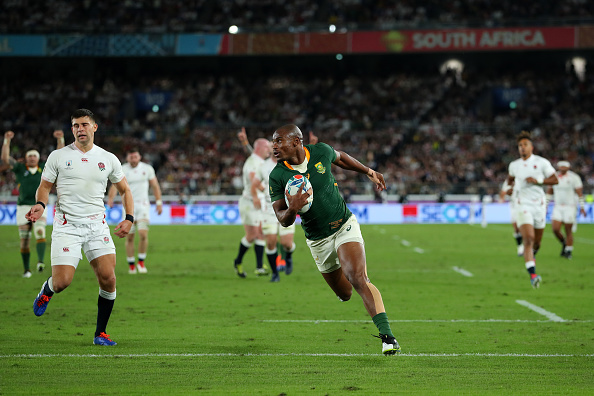Siya Kolisi and Rassie Erasmus often go out of their way to remind the media and public about how far Mapimpi has come.
Kolisi, whose own rags-to-riches story is well documented, understands how difficult it is to beat the system and embrace a completely different language and culture. Erasmus, who has over two decades of experience in the South African system as a player and coach, knows how difficult it is to make the step up after the age of 25.
Mapimpi’s rise has been particularly remarkable in these respects. On Saturday, the former Border centre became the first South African to score a try in the World Cup final. That five-pointer boosted his tally for the tournament to six.
The softly-spoken wing appeared surprised when he was told about the record after the monumental win against England.
‘It was an unbelievable moment for me,’ he said as he faced the media, a World Cup winners’ medal around his neck.
‘I got the ball from Malcolm Marx. I saw that Lukhanyo Am was on my inside. I chipped the ball and he got the ball back. I saw that there was no one in front of me. I chased up and he gave me the ball to score.’
Watch: Boks’ World Cup final tries
What was more mpressive, and perhaps more significant in terms of the contest, was Mapimpi’s showing under the high ball.
Erasmus reiterated after the game that the wing ‘couldn’t catch a ball’ when he first arrived at the Boks in June 2018. In the 2019 World Cup final, however, Mapimpi’s anticipation and ability to pluck the pill from the sky allowed the Boks to make some important territorial gains.
‘When you get to the highest level you need more skills to compete against the better sides,’ said Mapimpi. ‘I’m not going to lie, I had a lot of work to do when I first arrived at the Boks.
‘I trained hard with coach Mzwandile Stick. That was an important part of my career and I have to credit coach Stick for his input.
‘Thanks to the coaches for helping me at this World Cup. Thanks to Willie le Roux and Lukhanyo. I owe a lot to my coaches and teammates.’
Mapimpi took a moment to compose himself after he was asked about his unconventional road to the top. It’s a remarkable story, and one he retells over and over in order to remind other people from similar backgrounds to chase their dreams.
‘I wasn’t thinking about the World Cup in 2015. I was playing for Border at that stage. I watched the tournament from my home in the Eastern Cape and admired players like Bryan Habana. I never thought the day would come where I would be standing here, let alone wearing this medal.
‘This means so much to me as someone coming from the rural area in the Eastern Cape. I didn’t play Craven Week or SA Schools. Fortunately I had people who pushed me and suggested that I could be more.
ALSO READ: Mapimpi try the watershed – Faf
‘At that stage I was playing Sunday league. They said that rugby could be a career, but when I looked at my situation I just didn’t see how. I was so far removed from the system and I just couldn’t see a pathway to the top.
‘Then I got a call from a local club. I went to play for them and we won the club champs. Then I got a call from Border in 2014.
‘I saw a few guys progressing to Super Rugby, and I set that as my goal. That was my dream, to play Super Rugby. When I got a call from the Southern Kings, that’s when things really started to happen for me.’
As Kolisi and Erasmus stated in the aftermath of their emphatic victory at the Yokohama Stadium, this Bok side compete to bring hope to South Africans from all walks of life.
As Mapimpi cradled the winners’ medal in his hand late on Saturday night, he spoke about what it represents.
‘This is a big achievement, not just for me but for people who come from a similar background. This is not only about me. I love playing rugby but we are trying to do a lot more with this team.’
ALSO READ: Bringing SA people hope is a privilege – Rassie
Photo: Dan Mullan/Getty Images





